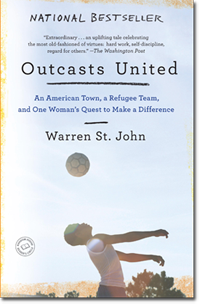Excerpt
The teams shook hands and the Fugees quickly ran to the bench for water and oranges, which awaited them in two white plastic grocery bags. A few moments later, the referee approached. He looked to be in his late fifties, white, with a graying mustache. He asked Luma if he could address her players. Luma hesitated. She was uncomfortable handing over her team’s attention to anyone, especially a stranger. A little warily, she summoned her team, who gathered in front of the referee some ten yards from their bench.
“Gentlemen,” he said, “I’d like to thank you. You played the ball the entire game, and you didn’t take any cheap shots. They got frustrated and started hacking, and you didn’t retaliate. So I’d like to commend you on your sportsmanship.” The referee paused for a moment and swallowed hard.
“And that was one of the most beautiful games of soccer I’ve ever seen,” he said.
THIS WAS THE first time I’d ever seen the Fugees play. I’d shown up knowing little about the team other than that the players were refugees and the coach a woman, and that the team was based in a town called Clarkston. In a little more than a decade, the process of refugee resettlement had transformed Clarkston from a simple southern town into one of the most diverse communities in America. And yet few in Atlanta, let alone in the world beyond, had taken notice. Mention the “refugees of Clarkston” and even many Atlantans will ask first if you’re referring to those who had arrived in town from New Orleans after Hurricane Katrina. Next, they’ll likely ask, “Where’s Clarkston?”
I came away from that first game intrigued. I had just seen a group of boys from a dozen war-ravaged countries come together as a team and create improbable beauty on the soccer pitch. How? Their coach, an intense and quiet presence who hid beneath the brim of her Smith College baseball cap and emerged only to dole out ferocious bits of inspiration or wisdom, presented another mystery. There was a palpable sense of trust and camaraderie between the players and their coach, and an equally powerful sense of fragility in all the tension and long silences.
In fact, things with the Fugees were more fragile than I could have realized that day. The team had no home field, owing to the myopia of local politicians who felt threatened by the presence of these newcomers. The players’ private lives were an intense daily struggle to stay afloat. They and their families had fled violence and chaos and found themselves in a society with a completely different set of values and expectations. Luma herself was struggling to hold her team—and herself—together. She had volunteered—naively, as she would admit—to help these boys on the field and off, unaware of the scope and intractability of their difficulties: post-traumatic stress, poverty, parental neglect in some cases, grief, shattered confidence, and, in more than one instance, simple anger at having to live the way they did. Luma, I would learn, had no particular background in social or human-rights work. She was just a normal woman who wanted, in her own way, to make the world a better place, and who, it turned out, was willing to go to extraordinary lengths to see that mission through. Luma had vowed to come through for her players and their families or to come apart trying, and on several occasions it seemed the latter outcome was more likely.
But more than anything that day, it was the surprising kinship of these kids from different cultures, religions, and backgrounds that drew me into the story and made me want to understand and tell it. One moment in the game underscored this for me more than any other.

